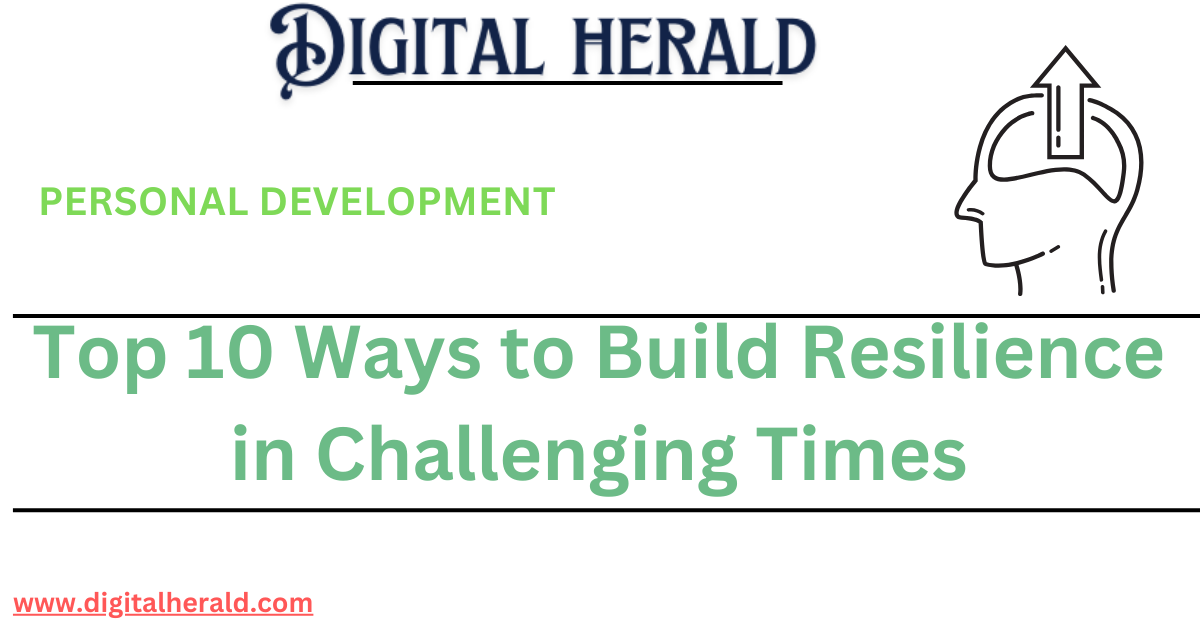
Top 10 Ways to Build Resilience in Challenging Times
In a world full of uncertainties and challenges, building resilience has become more important than ever. Resilience is the ability to bounce back from setbacks, adapt to change, and keep going in the face of adversity. It is not just about surviving tough times but also about thriving and finding strength in difficult situations. Whether it’s dealing with personal loss, professional challenges, or global crises, resilience can help you navigate through life’s ups and downs. Here are ten effective ways to build resilience in challenging times.
Top 10 Ways to Build Resilience in Challenging Times
1. Cultivate a Positive Mindset: Focus on What You Can Control
A positive mindset is a key component of resilience. It involves focusing on what you can control rather than dwelling on what you cannot. By shifting your perspective to see challenges as opportunities for growth, you can maintain a sense of hope and motivation even in tough times. Practice gratitude, look for the silver lining in difficult situations, and remind yourself of your strengths and past successes.
2. Develop Strong Social Connections: Lean on Your Support Network
Social support is crucial for resilience. Strong relationships with family, friends, and colleagues provide emotional support, practical help, and a sense of belonging. Don’t hesitate to reach out to others when you need support, and be there for others in return. Building a robust support network can help you feel more connected and less isolated during challenging times.
3. Practice Self-Care: Prioritize Your Physical and Mental Well-being
Taking care of yourself is essential for resilience. This includes getting enough sleep, eating a healthy diet, exercising regularly, and managing stress through relaxation techniques such as meditation or deep breathing. Self-care also means taking time for activities that bring you joy and relaxation. By prioritizing your physical and mental well-being, you can better cope with stress and bounce back from setbacks.
4. Set Realistic Goals: Break Down Challenges into Manageable Steps
Setting realistic goals helps you stay focused and motivated during difficult times. Break down larger challenges into smaller, manageable steps, and celebrate small victories along the way. This approach not only makes challenges feel less overwhelming but also provides a clear path forward, helping you maintain momentum and resilience.
5. Embrace Change: Be Flexible and Adaptable
Resilience involves being adaptable and open to change. Instead of resisting change, try to embrace it as a natural part of life. Flexibility allows you to adjust your plans and expectations as needed, which is crucial when facing unexpected challenges. By being adaptable, you can find new ways to achieve your goals and overcome obstacles.
6. Learn from Adversity: View Challenges as Learning Opportunities
Every challenge presents an opportunity to learn and grow. Reflect on past experiences and consider what you can learn from them. What worked well? What could you do differently next time? By viewing challenges as learning opportunities, you can build resilience and become better equipped to handle future adversity.
7. Develop Problem-Solving Skills: Take a Proactive Approach to Challenges
Strong problem-solving skills are essential for resilience. When faced with a challenge, take a proactive approach by identifying the problem, brainstorming possible solutions, and taking decisive action. By breaking problems down into smaller parts and systematically addressing each one, you can feel more in control and capable of overcoming obstacles.
8. Maintain a Sense of Purpose: Stay Connected to Your Values and Goals
Having a sense of purpose can provide motivation and direction during difficult times. Whether it’s a commitment to your family, your work, or a cause you care about, staying connected to your values and goals can help you maintain resilience. Purpose gives you a reason to keep going even when things get tough, and it can provide a sense of meaning that helps you navigate through adversity.
9. Practice Mindfulness and Emotional Regulation: Stay Present and Calm
Mindfulness involves staying present and fully engaging with the current moment without judgment. It can help you manage stress, regulate your emotions, and maintain a clear perspective in challenging situations. Techniques like meditation, deep breathing, and mindful movement can help you stay calm and focused, allowing you to respond to adversity with clarity and resilience.
10. Build Confidence Through Small Wins: Celebrate Your Progress
Confidence in your ability to handle challenges is a critical aspect of resilience. Build confidence by setting and achieving small goals, and celebrate your progress along the way. Acknowledge your achievements, no matter how small, and use them as reminders of your capability to overcome adversity. Each small win strengthens your belief in yourself, making it easier to tackle larger challenges.
Cultural Context in India: Resilience takes on unique forms in different cultural contexts. In India, resilience is often linked to the values of family support, community, and spirituality. Drawing on these cultural strengths, such as relying on extended family networks or finding solace in spiritual practices, can enhance resilience. Additionally, adapting traditional practices like yoga and meditation to modern life can provide practical tools for managing stress and building resilience.
Resilience in the Workplace: Building resilience is not only personal but also extends to professional life. In the workplace, resilience can help individuals cope with job stress, adapt to change, and maintain productivity during difficult periods. Employers can support resilience by promoting a positive work environment, providing resources for stress management, and encouraging a culture of flexibility and support.
The Role of Technology: Technology can both aid and hinder resilience. While constant connectivity can be overwhelming, it also provides access to resources like online therapy, resilience-building apps, and supportive communities. Leveraging technology wisely, such as using apps for meditation, goal setting, or connecting with like-minded individuals, can enhance your resilience toolkit.
Building resilience is a journey that involves developing skills, mindsets, and habits that help you navigate life’s challenges with strength and grace. By cultivating a positive mindset, nurturing your social connections, practicing self-care, and embracing change, you can build a resilient foundation that supports you in both good times and bad. Remember, resilience is not about avoiding difficulties but about facing them with courage and confidence. With these ten strategies, you can enhance your ability to bounce back from setbacks, find growth in adversity, and continue moving forward no matter what challenges come your way.
Also read: Top 10 Best Hill Stations in India
Last Updated on: Wednesday, September 25, 2024 7:09 am by Admin | Published by: Admin on Wednesday, September 4, 2024 9:38 am | News Categories: General
About Us: Digital Herald covers the latest News on Current News, Business, Sports, Tech, Entertainment, Lifestyle, Automobiles, and more, led by Editor-in-Chief Ankur Srivastava. Stay connected on Facebook, Instagram, LinkedIn, X (formerly Twitter), Google News, and Whatsapp Channel.
Disclaimer: At Digital Herald, we are committed to providing accurate, reliable, and thoroughly verified information, sourced from trusted media outlets. For more details, please visit our About, Disclaimer, Privacy Policy, Terms & Conditions. If you have any questions, feedback, or concerns, feel free to contact us through email.
Contact Us: prachi.qimedia@gmail.com







